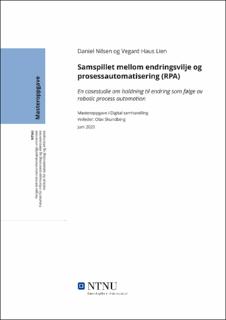| dc.contributor.advisor | Skundberg, Olav | |
| dc.contributor.author | Nilsen, Daniel | |
| dc.contributor.author | Lien, Vegard Haus | |
| dc.date.accessioned | 2021-09-15T16:01:55Z | |
| dc.date.available | 2021-09-15T16:01:55Z | |
| dc.date.issued | 2020 | |
| dc.identifier | no.ntnu:inspera:57322370:24564776 | |
| dc.identifier.uri | https://hdl.handle.net/11250/2777498 | |
| dc.description.abstract | Stadig flere bedrifter har begynt å ta i bruk robotic process automation (RPA) for å effektivisere ansattes arbeidsoppgaver, for eksempel for å opparbeide seg et konkurransefortrinn i et kompetitivt marked. Når robotene introduseres på arbeidsplassen kan man tenke seg at dette bringe med seg endringer, ikke bare på bedriftens effektivitet og kapasitet, men også de ansattes arbeidshverdag. Dette forskningsprosjektet har som hensikt å utforske følgende forskningsspørsmål: Hvordan endrer RPA ansattes arbeidshverdag, hvilken effekt har innføringen av RPA-er på ansattes endringsvilje? og Hvilke faktorer ved innføring av RPA påvirker ansattes endringsvilje?
For å besvare forskningsspørsmålene er det gjennomført en kvalitativ studie, bestående av seks casebedrifter, med til sammen ti informanter. Bedriftene opererer hovedsakelig i Norge, med kontorer og avdelinger over hele landet. Alle bedriftene driver med forskjellig kjernevirksomhet, men har flere fellestrekk i form av støttefunksjoner. Datainnsamlingen består i hovedsak av intervjuer med ansatte fra alle bedriftene.
Funnene i forskningsprosjektet viser at RPA har ført til følgende endringer på ansattes arbeidshverdag: mindre overtidsarbeid, overgang fra enkle repetitive oppgaver til mer komplekse oppgaver, ansatte tilegner seg ny kunnskap, nye type arbeidsoppgaver, endring i arbeidsstilling, mer tid til samarbeid med kunder og mer tid til samarbeid på tvers av avdelinger. Undersøkelsen danner også et bilde av nærmest utelukkende positiv effekt på ansatte endringsvilje i etterkant av innføring av RPA på arbeidsplassen. Ansatte ble motivert av å se effektene av automatiseringen. Dette har skapt positive holdninger til endring, og kultur for kontinuerlig endring på arbeidsplassen. Det er i tillegg utarbeidet en modell for faktorer som påvirker endringsvilje i positiv eller negativ retning i forbindelse med implementasjon av RPA. | |
| dc.description.abstract | Increasingly more companies have started to use robotic process automation (RPA) to streamline employee workloads, for example, to gain an advantage in a competitive market. When the robots are introduced in the workplace, it is conceivable that this will bring changes, not only to the company's efficiency and capacity, but also to the employees' everyday work. The purpose of this research project is to explore the following research questions: How does RPA change employees' working day, what effect does the introduction of RPAs have on employees' willingness to change?, and What factors when introducing RPA affect employees' willingness to change?
To answer the research questions, a qualitative study, consisting of six case companies, was conducted with a total of ten interviews. The companies operate mainly in Norway, with offices and departments throughout the country. All companies operate with different core activities but have several common features in the form of support functions. The data collection mainly consists of interviews with employees from all these companies.
The findings of the research project show that RPA has led to the following changes in the employees' work day: less overtime, transition from simple repetitive tasks to more complex tasks, employees acquire new knowledge, new types of tasks, change in work position, more time for cooperation with customers and more time to collaborate across departments. The study also paints a picture of the almost exclusively positive effect on employees' willingness to change based on the introduction of RPA in the workplace. Employees were motivated to see the effects of automation. This has created positive attitudes towards change, and a culture of continuous change in the workplace. In addition, a model has been developed for factors that affect willingness to change in a positive or negative direction in connection with the implementation of RPA. | |
| dc.language | | |
| dc.publisher | NTNU | |
| dc.title | Samspillet mellom endringsvilje og prosessautomatisering (RPA) | |
| dc.type | Master thesis | |
